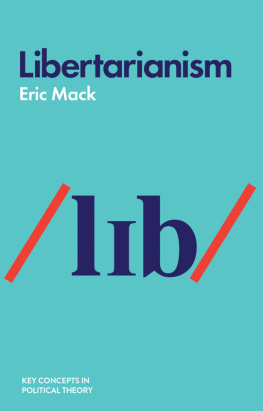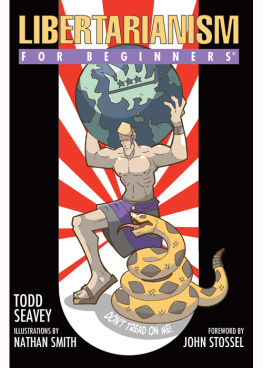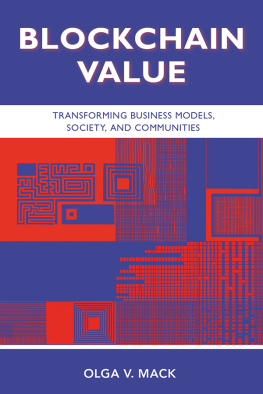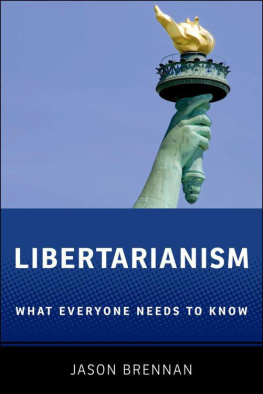Eric Mack - Libertarianism
Here you can read online Eric Mack - Libertarianism full text of the book (entire story) in english for free. Download pdf and epub, get meaning, cover and reviews about this ebook. year: 2018, genre: Politics. Description of the work, (preface) as well as reviews are available. Best literature library LitArk.com created for fans of good reading and offers a wide selection of genres:
Romance novel
Science fiction
Adventure
Detective
Science
History
Home and family
Prose
Art
Politics
Computer
Non-fiction
Religion
Business
Children
Humor
Choose a favorite category and find really read worthwhile books. Enjoy immersion in the world of imagination, feel the emotions of the characters or learn something new for yourself, make an fascinating discovery.
Libertarianism: summary, description and annotation
We offer to read an annotation, description, summary or preface (depends on what the author of the book "Libertarianism" wrote himself). If you haven't found the necessary information about the book — write in the comments, we will try to find it.
Libertarianism — read online for free the complete book (whole text) full work
Below is the text of the book, divided by pages. System saving the place of the last page read, allows you to conveniently read the book "Libertarianism" online for free, without having to search again every time where you left off. Put a bookmark, and you can go to the page where you finished reading at any time.
Font size:
Interval:
Bookmark:

- Charles Jones and Richard Vernon, Patriotism
- Roger Griffin, Fascism
- Peter J. Steinberger, Political Judgment
- Fabian Wendt, Authority
- Eric Mack, Libertarianism

Copyright Eric Mack 2018
The right of Eric Mack to be identified as Author of this Work has been asserted in accordance with the UK Copyright, Designs and Patents Act 1988.
First published in 2018 by Polity Press
Polity Press
65 Bridge Street
Cambridge CB2 1UR, UK
Polity Press
101 Station Landing
Suite 300
Medford, MA 02155, USA
All rights reserved. Except for the quotation of short passages for the purpose of criticism and review, no part of this publication may be reproduced, stored in a retrieval system or transmitted, in any form or by any means, electronic, mechanical, photocopying, recording or otherwise, without the prior permission of the publisher.
ISBN-13: 978-1-5095-1929-3
ISBN-13: 978-1-5095-1930-9(pb)
A catalogue record for this book is available from the British Library.
Library of Congress Cataloging-in-Publication Data
Names: Mack, Eric, 1946- author.
Title: Libertarianism / Eric Mack.
Description: Cambridge, UK ; Medford, MA : Polity Press, 2018. | Series: Key concepts in political theory | Includes bibliographical references and index.
Identifiers: LCCN 2018002844 (print) | LCCN 2018019786 (ebook) | ISBN 9781509519330 (Epub) | ISBN 9781509519293 (hardback) | ISBN 9781509519309 (pbk.)
Subjects: LCSH: Libertarianism. | Political science--Philosophy.
Classification: LCC JC585 (ebook) | LCC JC585 .M33 2018 (print) | DDC 320.51/2--dc23
LC record available at https://lccn.loc.gov/2018002844
Typeset in 10.5 on 12 pt Sabon
by Fakenham Prepress Solutions, Fakneham, Norfolk NR21 8NL
Printed and bound in Great Britain by CPI Group (UK) Ltd, Croydon
The publisher has used its best endeavours to ensure that the URLs for external websites referred to in this book are correct and active at the time of going to press. However, the publisher has no responsibility for the websites and can make no guarantee that a site will remain live or that the content is or will remain appropriate.
Every effort has been made to trace all copyright holders, but if any have been inadvertently overlooked the publisher will be pleased to include any necessary credits in any subsequent reprint or edition.
For further information on Polity, visit our website: politybooks.com
I wish to thank Mary Sirridge, Doug Den Uyl, Doug Rasmussen, David Schmidtz, and Hillel Steiner for their very helpful feedback on portions of this book, George Owers for his excellent editorial suggestions, and Ian Tuttle for his meticulous copy-editing. I also thank Liberty Fund and the Murphy Institute of Political Economy for their generous support.
For Josh and Sara, Rebekah and Jon, and Rose
Introduction
This book is about the stance within political philosophy known as libertarianism. More specifically, it focuses on the key philosophical themes and arguments that have been offered on behalf of libertarianism. I begin this introduction with an explanation of what political libertarianism is. Then I briefly describe the central themes and arguments of libertarian theory that are developed in this book, and where and in what form these themes and arguments are to be found.
Libertarianism is advocacy of individual liberty as the fundamental political norm. An individuals liberty is understood as that individual not being subject to interference by other agents in her doing as she sees fit with her own person and legitimate holdings. Your liberty is violated when, by striking you in the nose, I prevent you from using your face as you choose. Your liberty is not violated when I dodge the punch you aim at me which would otherwise rearrange my nose; for my nose is not part of your person or legitimate holdings. Libertarianism especially in its more hardcore forms maintains that respect for ones liberty is the basic moral demand that each individual can make against all other individuals and groups. A bit more precisely, each individual who is not herself violating the principle that liberty is to be respected can demand respect for her liberty from all other individuals and groups. In the name of liberty so understood, each individual who is respectful of others liberty may demand that she not be murdered, enslaved, maimed, assaulted, robbed, or subjected to extortion through the threat of being murdered, enslaved, maimed, assaulted, or robbed. So stringent is the demand that individuals not be subjected to such morally criminal treatment that coercion is permissible if (but only if) it blocks or nullifies the effects of such violations of liberty.
Libertarians, as we shall see, differ about the justification of this moral requirement that each persons liberty be respected. And they may differ about the precise implications of this requirement. However, libertarians are united in the view that violations of the liberty of liberty-respecting individuals are morally criminal whether it is carried out by individual ruffians or by the agents or high officials of political or legal institutions. As John Locke put it in his Second Treatise of Government, The injury and the crime is equal, whether committed by the wearer of a crown, or some petty villain. The title of the offender, and the number of his followers, make no difference in the offence, unless it be to aggravate it (1980 [1689]: 176). There are no special reasons of state that allow a wearer of a crown or a presidential seal or a police badge to treat any individual in ways that would be recognized as criminal homicide, kidnapping, assault, theft, or extortion if carried out by a freelance lout.
Ruling out reasons of state means that state action must be vindicated by ordinary norms of morality the norms by which we judge whether one individuals treatment of another is morally permissible or impermissible. State actors have no moral privileges. According to the libertarian, at least as a first approximation, ordinary norms of morality require that harmful force or the threat of such force be used against individuals only to defend against or extract restitution for, or to punish initiated force or threat of force, or to enforce compliance with voluntary contracts. Hence, state use of force and the threat of force must also be confined to the functions of defense, restitution, punishment, and the enforcement of contract. Libertarians maintain that the enforcement of a framework within which individuals are secure in their persons, possessions, and contractual arrangements is the key condition for the emergence of a peaceful, tolerant, pluralistic, and prosperous social and economic order. Radical restriction on state action is the key to a flourishing cooperative society.
Hardcore libertarianism rejects all states more extensive than the minimal or night-watchman state which employs coercion solely for the sake of protecting individual liberty. Hardcore anarchist libertarianism rejects even the minimal state on the grounds that in order to be a state it must employ coercion against liberty-respecting individuals. Softer-core versions of libertarianism accept marginal extensions in permissible coercive state action. Such a modest expansion in the scope of acceptable coercive measures may be justified by extending the range of enforceable moral claims that individuals have against their fellows; for example, to claims to assistance when they find themselves in dire straits. Or such an expansion may be based on the view that minor infringements on liberty can be justified if those infringements are necessary to serve some vitally important social condition; for example, the preservation of social peace or maintenance of institutions capable of protecting individuals against major violations of their liberty. As libertarianism becomes softer-core and the small state replaces anarchy or the minimal state as the object of ideological advocacy, libertarianism shades into classical liberalism.
Next pageFont size:
Interval:
Bookmark:
Similar books «Libertarianism»
Look at similar books to Libertarianism. We have selected literature similar in name and meaning in the hope of providing readers with more options to find new, interesting, not yet read works.
Discussion, reviews of the book Libertarianism and just readers' own opinions. Leave your comments, write what you think about the work, its meaning or the main characters. Specify what exactly you liked and what you didn't like, and why you think so.













